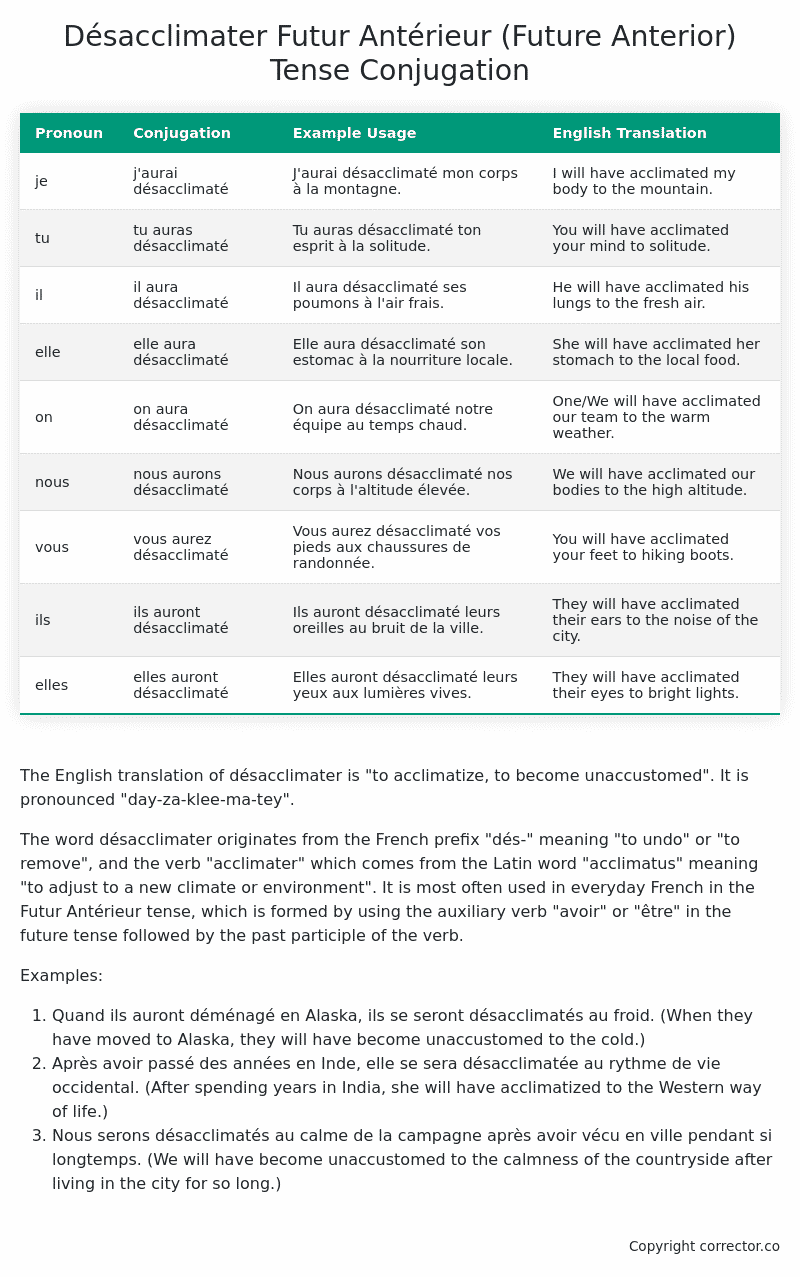Futur Antérieur (Future Anterior) Tense Conjugation of the French Verb désacclimater
Introduction to the verb désacclimater
The English translation of désacclimater is “to acclimatize, to become unaccustomed”. It is pronounced “day-za-klee-ma-tey”.
The word désacclimater originates from the French prefix “dés-” meaning “to undo” or “to remove”, and the verb “acclimater” which comes from the Latin word “acclimatus” meaning “to adjust to a new climate or environment”. It is most often used in everyday French in the Futur Antérieur tense, which is formed by using the auxiliary verb “avoir” or “être” in the future tense followed by the past participle of the verb.
Examples:
- Quand ils auront déménagé en Alaska, ils se seront désacclimatés au froid. (When they have moved to Alaska, they will have become unaccustomed to the cold.)
- Après avoir passé des années en Inde, elle se sera désacclimatée au rythme de vie occidental. (After spending years in India, she will have acclimatized to the Western way of life.)
- Nous serons désacclimatés au calme de la campagne après avoir vécu en ville pendant si longtemps. (We will have become unaccustomed to the calmness of the countryside after living in the city for so long.)
Table of the Futur Antérieur (Future Anterior) Tense Conjugation of désacclimater
| Pronoun | Conjugation | Example Usage | English Translation |
|---|---|---|---|
| je | j’aurai désacclimaté | J’aurai désacclimaté mon corps à la montagne. | I will have acclimated my body to the mountain. |
| tu | tu auras désacclimaté | Tu auras désacclimaté ton esprit à la solitude. | You will have acclimated your mind to solitude. |
| il | il aura désacclimaté | Il aura désacclimaté ses poumons à l’air frais. | He will have acclimated his lungs to the fresh air. |
| elle | elle aura désacclimaté | Elle aura désacclimaté son estomac à la nourriture locale. | She will have acclimated her stomach to the local food. |
| on | on aura désacclimaté | On aura désacclimaté notre équipe au temps chaud. | One/We will have acclimated our team to the warm weather. |
| nous | nous aurons désacclimaté | Nous aurons désacclimaté nos corps à l’altitude élevée. | We will have acclimated our bodies to the high altitude. |
| vous | vous aurez désacclimaté | Vous aurez désacclimaté vos pieds aux chaussures de randonnée. | You will have acclimated your feet to hiking boots. |
| ils | ils auront désacclimaté | Ils auront désacclimaté leurs oreilles au bruit de la ville. | They will have acclimated their ears to the noise of the city. |
| elles | elles auront désacclimaté | Elles auront désacclimaté leurs yeux aux lumières vives. | They will have acclimated their eyes to bright lights. |
Other Conjugations for Désacclimater.
Le Present (Present Tense) Conjugation of the French Verb désacclimater
Imparfait (Imperfect) Tense Conjugation of the French Verb désacclimater
Passé Simple (Simple Past) Tense Conjugation of the French Verb désacclimater
Passé Composé (Present Perfect) Tense Conjugation of the French Verb désacclimater
Futur Simple (Simple Future) Tense Conjugation of the French Verb désacclimater
Futur Proche (Near Future) Tense Conjugation of the French Verb désacclimater
Plus-que-parfait (Pluperfect) Tense Conjugation of the French Verb désacclimater
Passé Antérieur (Past Anterior) Tense Conjugation of the French Verb désacclimater
Futur Antérieur (Future Anterior) Tense Conjugation of the French Verb désacclimater (this article)
Subjonctif Présent (Subjunctive Present) Tense Conjugation of the French Verb désacclimater
Subjonctif Passé (Subjunctive Past) Tense Conjugation of the French Verb désacclimater
Subjonctif Imparfait (Subjunctive Imperfect) Tense Conjugation of the French Verb désacclimater
Conditionnel Présent (Conditional Present) Tense Conjugation of the French Verb désacclimater
Conditionnel Passé (Conditional Past) Tense Conjugation of the French Verb désacclimater
L’impératif Présent (Imperative Present) Tense Conjugation of the French Verb désacclimater
L’infinitif Présent (Infinitive Present) Tense Conjugation of the French Verb désacclimater
Struggling with French verbs or the language in general? Why not use our free French Grammar Checker – no registration required!
Get a FREE Download Study Sheet of this Conjugation 🔥
Simply right click the image below, click “save image” and get your free reference for the désacclimater Futur Antérieur tense conjugation!

Désacclimater – About the French Futur Antérieur (Future Anterior) Tense
Construction
Common Everyday Usage Patterns
Interactions with Other Tenses
For example
Summary
I hope you enjoyed this article on the verb désacclimater. Still in a learning mood? Check out another TOTALLY random French verb conjugation!


